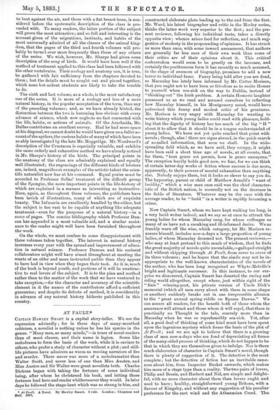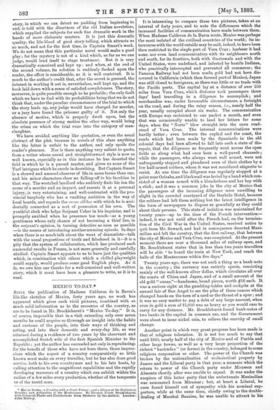AT FAULT.*
CAPTAIN HAWLEY SMART is Et capital story-teller. We use the expression advisedly ; for in these days of many-mouthed criticism, a novelist is nothing unless he has his species in the genus. "Many men, as many minds,"—is truer of novel-readers than of most classes, and their name is legion. Some like melodrama to form the basis of the work, while it is caviare to others, who prefer a study of character without a plot ; and still- life pictures have admirers as warm as moving narrators of fire and murder. There never was more of a melodramatist than Walter Scott, and never less of one than Miss Austen, and Miss Austen and Sir Walter were great novelists both. Charles Dickens began with taking the fortunes of some individual being, after whom he christened his book, and letting those fortunes lead hero and reader whithersoever they would. In later days he followed the stage-bent which was so strong in him, and * At Fault. A Novel. By Hawley Smart. 3 yob. London: Chapman and Hall. 1833.
constructed elaborate plots leading up to the end from the first. Mr. Ward, his latest biographer and critic in the Morley series,. thinks the latter work very superior to the first ; and the pre- sent reviewer, following his individual taste, takes a directly opposite view; whence arises food for reflection, and much sug- gestion of modesty in the propounding of opinions. It has struck us more than once, with some inward amusement, that authors are generally far less sure of their own work than some of their critics are of their opinions about it. This critical cocksnredom would seem to be greatly on the increase, and certainly the posthumous form it has recently so much assumed, in the shape of essences of biography, promises to add a new terror to individual fame. Fancy being told after you are dead, as Macaulay has lately been informed by Mr. Cotter Morison,. that you ought not to have been so frivolous as to recite Homer to yourself when sea-sick on the way to Dublin, instead of "thinking out" the Irish problem. A certain Homeric laughter possessed us as we read and amused ourselves by reflecting how Macaulay himself, in his Montgomery mood, would have pulverised this funny and modest critic of his greatness. Mr. Morison is very angry with Macaulay for wanting to write history which young ladies could read with pleasure, hold- ing that the dignity of history has too much of the big " H " about it to allow that it should be in a tongue understanded of young ladies. We have not yet quite reached that point with novels ; though, alas ! there are signs abroad, in the quick-march of so-called information, that soon we shall. In the wide- spreading field which, as we have said, they occupy, it might. have been said a short time ago of novels, at all events, that. for them, "tout genre eat permis, hors le genre ennuyenx." The exception hardly holds good now, we fear, for we can think of certain latter-day works of fiction whose success is due more, apparently, to their powers of mental exhaustion than anything else. Nobody enjoys them, but it looks so clever to say you do. The hypocrisy, parent or child of Matthew Arnold's "want of lucidity," which a wise man once said was the chief character- istic of the British nation, is assuredly not on the decrease in the fields of literature. Whatever may be the case with the average reader, to be " lucid " in a writer is rapidly becoming a. crime.
Now Captain Smart, whom we have kept waiting too long, is a very lucid writer indeed; and we say so at once to attract the young ladies for whom Macaulay sang, for whose suffrages so many of us have yet a sneaking and ill-informed desire. We as frankly warn off the wise, which category, let Mr. Morison re- assure himself, includes now-a-days a large proportion of young- ladies, of whom Macaulay dreamed not. The present reviewer,— who may at least pretend to this much of wisdom, that he finds the great majority of novels quite unreadable,—galloped straight and without skipping through At Fault, from cover to cover of its three volumes ; and he hopes that the simile may not be in- appropriate to the well-known characteristics of the novels of the author, who has been long recognised as Whyte-Melville's bright and legitimate successor. In this instance, to our sur- prise we discovered, Captain Smart has deserted the racing and riding world altogether, except where, just within sight of the " finis " winning-post, his private version of Uncle Dick's memorial (which all men carry about with them in some shape' or another) suddenly breaks out in one irrepressible allusion to the "great annual spring riddle on Epsom Downs." We- can assure all readers, for the benefit both of those whom the- assurance will attract and those whom it will repel, thatthere is' practically no Thought in the tale, scarcely more than in Macaulay when he was so reprehensibly sea-sick. Yet, after' all, a good deal of thinking of some kind must have been spent upon the ingenious mystery which forms the basis of the plot of At Fault ; and we are apt to believe that there is a growing- class of men now-a-days who are fond of depreciating all forma- of the many-sided process of thinking, which do not happen to be- that in which they are themselves given to indulge. Nor is there much elaboration of character in Captain Smart's novel, though there is plenty of suggestion of it. The detective is the most, complete; but the detective of fiction has an inevitable same- ness about him, from Inspector Bucket onwards, which makes= him more of a stage type than a reality. The two pairs of lovers, Philip and Bessie, and Herbert and Nid, are simple and delight- ful, with no more character about them than lovers ought ani. used to have ; healthy, straightforward young Britons, with a flavour of Kingsley, and without any suggestion of his peculiar- preference for the east wind and the Athanasian Creed. The,
story, in which we can detect no padding from beginning to end, is told with the directness of the old Italian novelettes, which supplied the subjects for such fine dramatic work in the hands of more elaborate masters. It is just this dramatic quality, the life-blood of good story-telling, which attracts us so much, and not for the first time, in Captain Smart's work. We do not mean that this particular novel would make a good play ; for the mystery is not of a kind which, as far as we can judge, would lend itself to stage treatment. But it is very dramatically conceived and kept up : and when, at the end of the second volume, its solution is suddenly flashed upon the reader, the effect is considerable, as it is well contrived. It is much to the author's credit that, after the secret is guessed, the interest in working it out is, nevertheless, well kept up, and. the book laid down with a sense of satisfied completeness. The story, moreover, is quite possible enough to be probable; the only fault which we have to find with its probabilities being that we do not think that, under the peculiar circumstances of the trial to which the story leads up, any judge would have charged for murder, .or a jury have found the prisoner guilty of it. Not only the absence of motive, which is properly dwelt upon, but the absolute presence of strong motive the other way, would bring the crime on which the trial runs into the category of man- slaughter.
We have avoided anything like quotation, or even the usual abstract of the plot, because in novels of this class anything like the latter is unfair to the author, and only spoils the reader's pleasure. Nor is there anything very salient to quote, from a writer whose sound and straightforward style is now so well known, especially as in this instance he has deserted the field in which he is a passed master, and given us none of the Turf intrigues which he excels in describing. But Captain Smart is a shrewd and amused observer of life in more forms than one, and his minor characters show no falling.off in his faculties in that way. The wretched landlord who suddenly finds his inn the scene of a murder and an inquest, and resents it as a personal injury, is very entertaining, and well-contrasted with the pro- vincial busybody who has a vaulting ambition in the way of local boards, and regards the cause cilebre with which he is acci- dentally connected as a sort of possession of his own. The youthful clerk who helps Serjeant Usher in his inquiries, and is promptly snubbed when he presumes too much—as a young gentleman whose only chance of not becoming a thief lies, in the serjea.nt's opinion, in turning detective as soon as possible —is the means of introducing another amusing episode. In days when there is so much talk about the want of dramatists—talk with the usual proportions of truth and falsehood in it—it is a pity that the system of collaboration, which has produced such successful results in France, is not more generally and carefully studied. Captain Smart appears to us to have just the qualities which, in combination with others which a skilled playwright could supply, would produce some good English plays. As it is, we owe him our thanks for a well-conceived and well-written story, which it must have been a pleasure to write, as it is to read.



































 Previous page
Previous page